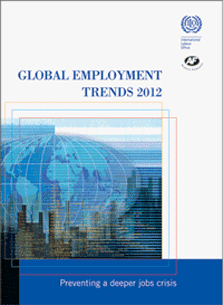 A4
A4

Paperback
•
2012
Pages: 120
ISBN: 9788171889501
For Sale in South Asia Only
INR 795

The annual Global Employment Trends assesses economic and social developments in global and regional labour markets. Based on the most recently available data and taking into account the macroeconomic context, the report sheds light on employment and unemployment dynamics, providing estimates and short-term projections of employment by sector, vulnerable employment, labour productivity and the working poor, as well as offering analysis of country-level issues and emerging labour market trends. Building on the ILO's Key Indicators of the Labour Market, the report also includes a consistent set of tables with regional and global estimates and projections of these labour market indicators.
Global Employment Trends 2012: Preventing a deeper jobs crisis reveals a global labour market in severe distress, with one out of three people in the labour market currently either unemployed or poor. The report calls for decisive, coordinated action to reduce the uncertainties that are holding back private investment and to restart the engine of global job creation.
The International Labour Organization was founded in 1919 to promote social justice and, thereby, to contribute to universal and lasting peace. Its tripartite structure is unique among agencies affiliated to the United Nations; the ILO's Governing Body includes representatives of governments, and of employers' and workers' organizations. These three constituencies are active participants in regional and other meetings sponsored by the ILO, as well as in the International Labour Conference a world forum that meets annually to discuss social and labour questions.
Over the years the ILO has issued for adoption by member States a widely respected code of international labour Conventions and Recommendations on freedom of association, employment, social policy, conditions of work, social security, industrial relations and labour administration, and child labour, among others.
The ILO provides expert advice and technical assistance to member States through a network of offices and multidisciplinary teams in over 40 countries. This assistance takes the form of labour rights and industrial relations counselling, employment promotion, training in small business development, project management, advice on social security, workplace safety and working conditions, the compiling and dissemination of labour statistics, and workers' education.
ILO